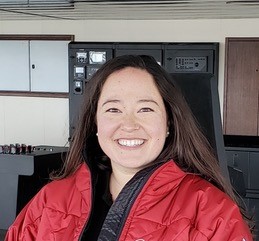Page Content
Plenaries

Clyde Auditorium, SEC Armadillo
Sunday, 22 February 2026, 05:00 PM (GMT)
Dr. Britney Schmidt is an Associate Professor at Cornell University. She and her team develop robotic tools and instruments to study Earth’s poles and other planets. Exploring Earth’s ice shelves and glaciers and the oceans beneath them with their robot Icefin, Schmidt and her team help to capture the impacts of changing climate, while understanding analogs for Ocean Worlds like Jupiter’s moon Europa. She has conducted nine field seasons in Antarctica and four in the Arctic. Her team has used Icefin to explore underneath the McMurdo, Ross, and Fimbul Ice Shelves and Thwaites Glacier in Antarctica and Wolstenholme Fjord, Greenland, working with NASA, NSF, Heising-Simons, Antarctica New Zealand, the British Antarctic Survey, and the Norwegian Polar Institute. A native of Tucson, AZ, she received a B.S. from the University of Arizona, and PhD from UCLA. Britney has a long history of NASA spacecraft involvement, including the Europa Clipper and Dawn missions and helped develop the Habitable Worlds Observatory, Europa Lander and Enceladus Orbilander concepts.

Clyde Auditorium, SEC Armadillo
Tuesday, 24 February 2026, 10:30 AM (GMT)
Prof. Eleanor Frajka-Williams is a Professor at the University of Hamburg, where she leads the Experimental Oceanography group. Her research investigates how ocean circulation-from submesoscale turbulence to the global overturning circulation-shapes and responds to Earth’s changing climate. Using sustained observations and process studies at sea, she explores ocean dynamics with tools such as autonomous underwater gliders to measure vertical velocities and turbulence, and mooring arrays to monitor the strength of the Atlantic Meridional Overturning Circulation (AMOC) and deep overflows. A particular focus of her work is how targeted observations can yield new physical insights and inform our understanding of large-scale climate variability. Originally from California, Frajka-Williams earned her PhD at the University of Washington and previously worked at the UK’s National Oceanography Centre and the University of Southampton before moving to Germany. She currently leads EPOC, Explaining and Predicting the Ocean Conveyor, an EU Horizon Europe project to reconceptualize the AMOC, and chairs the CLIVAR AMOC Task Team, which promotes international coordination across AMOC research communities.